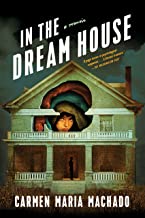In the Dream House by Carmen Maria Machado
Carmen Maria Machado’s new memoir, In the Dream House (Graywolf Press), describes her experience with the pain and anguish of a lesbian relationship gone horribly wrong, though at the time it seemed like true love.
Author of a 2018 award-winning short story collection (Her Body and Other Parties, Graywolf Press), Machado describes the inevitability of how the events of her life made her vulnerable. There was an incident of abuse when she was a teenager that left her reeling, depressed and isolated. She was religious, but fell in love with a married pastor at her church, who later was discovered to be having an affair with another parishioner. And then there was that masochistic fantasy …
When Machado meets the woman who seems perfect for her, their love affair starts out over the moon. They are the luckiest women in the world to have found each other — so compatible, so physically possessed by each other. But within a year, the other is making her cry, barking orders and insults, and leaving marks. Machado slides down the slippery slope of a deteriorating sense of self.
AN INNOVATIVE APPROACH
An important book about an important topic, but also, in spite of the despair it describes, a beautiful book. The dream house of the title is a symbol for the self, and what is known or admitted. Machado’s experience was one of falling apart, and the book is in fragments, connected by her sense of dislocation.
The many aspects of the dream house also give form to the titles of the book’s many small chapters: “Dream House as Utopia,” “Dream House as Romance Novel,” “Dream House as Lesbian Cult Classic.” Then, on page 21, the analogy gels with a very short chapter called “Dream House as Famous Last Words.” The chapter consists of one line: “‘We can fuck,’ she says, ‘but we can’t fall in love.’” A footnote at the bottom references “omens in love affairs,” as listed in an index of folk literature motifs. Many more examples of this kind follow.
Every story is just one story, and the story of abuse is one story, too.
The dream house is also the actual structure where Machado lived with her lover, but it’s a nightmare: “The house is not essential for domestic abuse,” writes Machado, “but hell, it helps: a private space where private dramas are enacted behind, as the cliché goes, closed doors; but also windows sealed against the sound, drawn curtains, silent phones.”
Along the way, some relevant, eye-opening facts: The first Lesbian Battering Conference was held in 1988; the original version of Aimee Mann’s song, “Voices Carry,” was written about an abusive relationship with a woman. “Most types of domestic abuse are completely legal,” states another one-line chapter, “Dream House as Epiphany.” Sometimes the abuser doesn’t recognize their behavior as abuse.
As Machado writes on page one: “If you need this book, it is for you.”
Buy this Book!
Amazon



